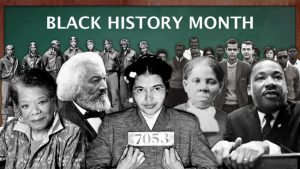
Ayanna Cooper shares teacher resources for Black History Month
Black History Week began as a week-long celebration to acknowledge achievements of Black Americans and other people of African descent 91 years ago. During the 1960s, this celebration grew into a month-long dedication to not only honor notable Black Americans but also to educate all Americans about the history and current achievements of people of African decent. Educators may have questions about how to approach celebrating Black History Month, especially in areas where there is lack of diversity within the student population or where Black History Month is not acknowledged school or district wide. How do we acknowledge the contributions of well-known heroes while creating space for current events and future leaders? Regardless of the context, Black History Month is a time to reflect on the past as we envision an even more inclusive society in the future. Here are five resources that provide a deeper understanding of Black History as well relevant current issues related to African Americans, diversity, and social justice.
1) National Museum of African American History & Culture
This museum opened in September of 2016 and is the only national museum solely dedicated to the documentation of African American history and culture. The NMAAHC has over 30,000 artifacts and interactive exhibits. Special events are held at the museum including discussions, screenings, and workshops. Due to the number of exhibits, multiple visits may be necessary in order to view all that the museum has to offer. Passes to visit the museum may be reserved online and free of charge.
In 2014, three librarians from San Francisco Public Schools, who are also members of Teachers for Social Justice, created a libguide dedicated to the Black Lives Matter Movement. The libguide was created to provide resources for educators and as a place where resources can be contributed. Resources include lesson plans for teaching Black Lives Matter, resources, official documents, poetry / art and videos of news cover of the movement.
3) Teaching Tolerance Resource Guide for Teaching the Civil Rights Movement
This resource provides guidance and essential practices for teaching the Civil Rights Movement. The practices include;
1. Educate for empowerment.
2. Know how to talk about race.
3. Capture the unseen.
4. Resist telling a simple story.
5. Connect to the present.
For each practice, suggestions and examples are provided to help educators think critically before divining in to content. These practices can also help educators evaluate the content of other resources with an effort to select the most appropriate resource depending upon learning objectives and the needs of the students.
4) Teaching Tolerance Webinar Series
Over two-dozen webinars are provided to educate and support open dialog around current events and issue. Topics that discuss equity, reduce prejudice, and serve as a tool to build and strengt hen relationships across the education community are available. Up and coming webinars in February include Equity Matters: Confronting Implicit Bias and Equity Matters: Understanding Equity Literacy.
Twenty lesson plans for students in grades 7 –12 are available and range from historical to more recent events. Some lesson plans include short video clips, newsletters, timelines, and other artifacts to help students apply the lessons learned to address current events and social issues. For example, the lesson plan entitled A History of Discrimination and Its Consequences, includes a glossary of terms related to the lesson.
With the number of resources available to educators and parents today, Black History Month celebrations have evolved. No longer are students expected to limit themselves to the more traditional assignments, like book reports. Assuring that lessons learned from the past can help to guide our future. All voices are heard and action is required in order to preserve and embrace diversity and equity, not only in February but year round.
Ayanna Cooper, EdD, is an educator, author, and advocate for culturally and linguistically diverse learners. Cooper supports educators in becoming change agents and leaders within the field of English language teaching. She’s a co-author of Evaluating ALL Teachers of English Learners and Students with Disabilities: Supporting Great Teaching, Corwin Press.






